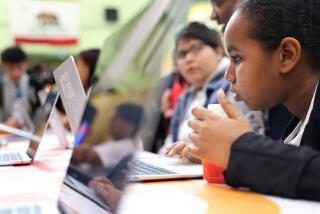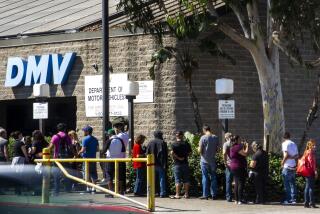New System Lets Students Phone In Answers to Tests
- Share via
CHICAGO — Dial “D” for diploma.
University students can now take exams from the comfort of their own homes using a telephone message system called Telequiz.
“I love it, but I don’t know why,” said student Jean Pajak. “Maybe it’s the spontaneity of it.”
In what is believed to be first student testing via touch-tone telephone, students at suburban Governors State University called in the answers to their Psychology 519 quiz on Sept. 29-30
They answered by punching in numbers that were registered with computerized voice-mail equipment.
Pajak and classmates took a 10-question multiple-choice quiz, punching the numbers 1 through 4 on their tough-tone phones to register their answers with a school computer.
Students taking Management 421 will also try the program, taking an exam of 15 true-or-false questions by pressing 1 for true or 2 for false.
“It’s a replacement for the old-fashioned No. 2 lead pencil,” said Donald Fricker, a professor of management information systems who developed the idea.
Fricker said Telequiz saves time and money.
“I can administer any quiz in just two or three days as opposed to where the secretary has to type it, I have to copy it, the class has to meet, and I still have to grade it,” he said.
The system also eliminates the need to travel to the college in suburban University Park. The 5,000-student school has no dormitories, and many students have outside job and family responsibilities.
The system lets instructors record up to 30 questions. It can handle just one student at a time.
Quiz-takers have six or seven seconds to think of an answer before the next question is asked--too short a time for a student to cheat by looking up the answer in a book, Fricker said.
In November, Telequiz will be demonstrated to representatives of 600 schools at the annual Computers on Campus conference in Myrtle Beach, S.C.
Teresa Barker took her psychology test sitting at the kitchen table after she had cleared the dinner dishes.
“Being at home, it was different than being somewhere where there’s a lot of pressure,” said Barker, 52, a child-welfare worker pursuing an undergraduate degree.
The system “gives a student tremendous flexibility,” Fricker said. “The student can be at his most relaxed. He can call in at 4 a.m. if that’s when he’s achieved nirvana and feels he knows the material.”
More to Read
Sign up for Essential California
The most important California stories and recommendations in your inbox every morning.
You may occasionally receive promotional content from the Los Angeles Times.










